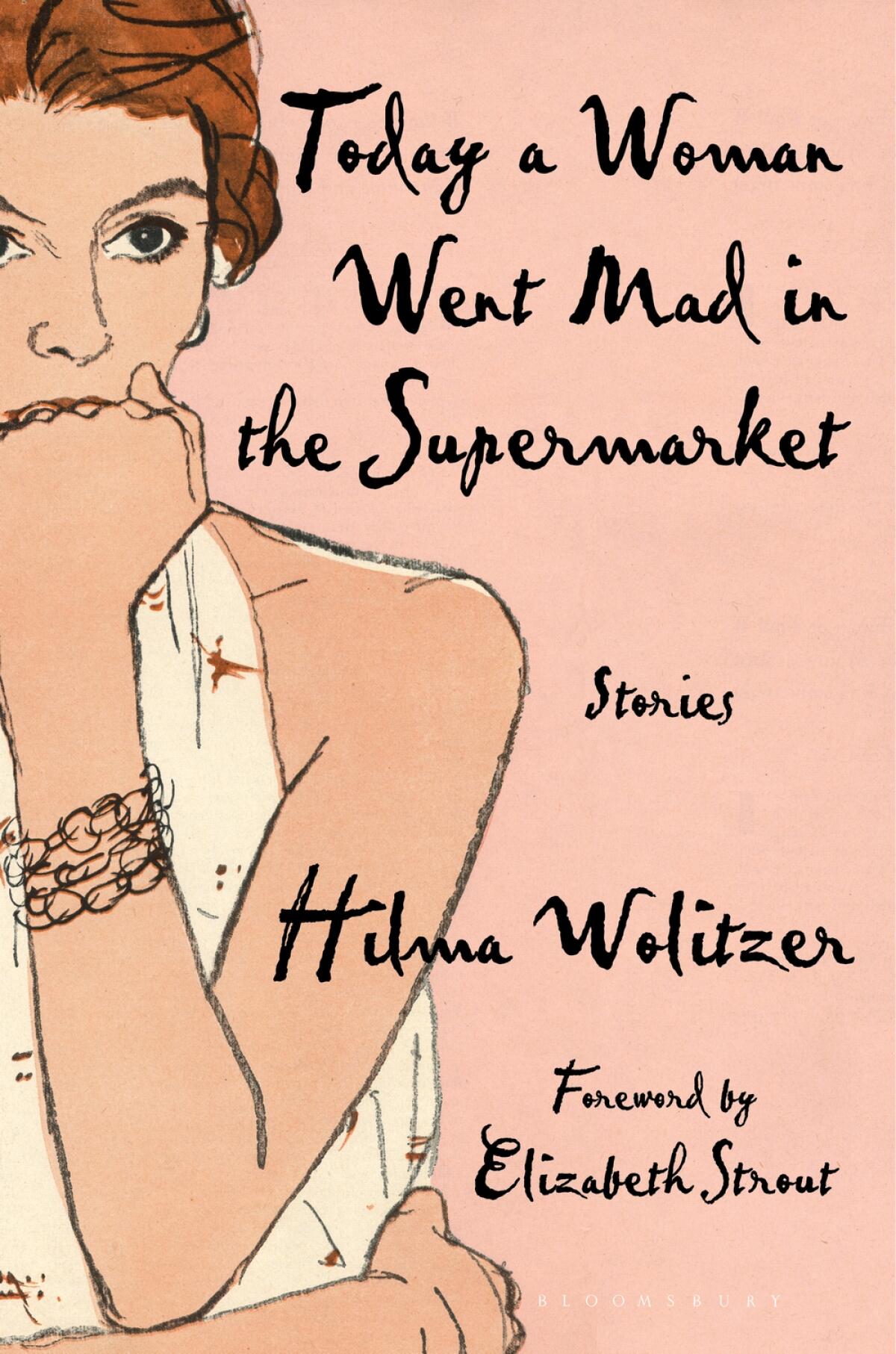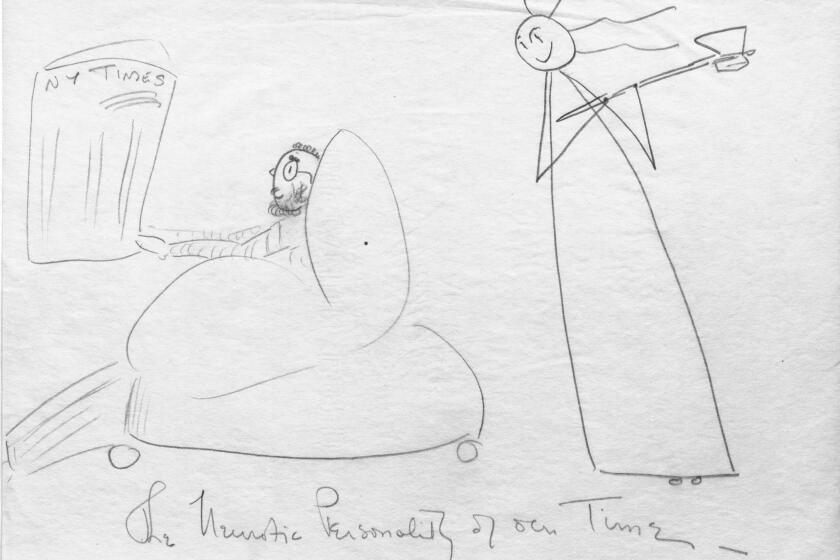Author Hilma Wolitzer lost her husband to COVID-19. So at 91, she wrote a story about it

On the Shelf
Today a Woman Went Mad in the Supermarket
By Hilma Wolitzer
Bloomsbury: 208 pages, $26
If you buy books linked on our site, The Times may earn a commission from Bookshop.org, whose fees support independent bookstores.
At the age of 9, Hilma Wolitzer published a poem in a journal sponsored by the New York City Department of Sanitation. Then she took a 35-year hiatus, publishing her next work at 44. “My pen name was ‘The Great Middle-Aged Hope,’” Wolitzer, now 91, told me recently, as wry as she and her writing have always been.
The occasion for our email conversation is the release of her 14th book, the story collection “Today a Woman Went Mad in the Supermarket.” Many of these pieces were first published in magazines in the 1960s and 1970s. The final story, written just before the book went into production, is a wrenching reflection of Wolitzer’s greatest loss.
Early in the pandemic, Wolitzer and her husband of 68 years were both hospitalized with COVID-19. Hilma Wolitzer recovered. Morton Wolitzer did not. Gently, I ask how she’s holding up. “I’m doing pretty well, with the extraordinary help of my family and friends,” she says. “My husband and I were in separate hospitals when he died. ... When I came home to our apartment, it was just as we’d left it. Dishes in the sink, a book left open on a table. His shoes were still next to the bed and his pillow still held the impression of his head. He seemed to have simply vanished.”
Wolitzer was isolated, but not alone. She has two daughters — Nancy, an inventive visual artist, and Meg, also a writer of acclaimed novels (including 2003’s “The Wife,” about a Hilma-like writer who awakens to feminism in midlife). It was Meg who suggested that her mom put out a new collection, hoping the project would help her recover.
“We all did what we could,” Meg tells me in an email, “but it was maddening not to be able to be with her and help her.” Meg had spent the weeks of her parents’ hospitalization re-reading Hilma’s stories, “and once again I thought they were amazing, and was convinced they should be published as a collection.” Fortunately, “Bloomsbury agreed, so the stories didn’t need to be published by Meg Wolitzer Press.”

Growing up in Syosset, N.Y., Meg “didn’t know anyone else in our suburb whose mother was a writer. I was extremely proud of her and her fiction, though I’m sure I barged in constantly while she was trying to work, and I do regret that.”
Between the ages of 44 and 91, Hilma Wolitzer published nine novels, four children’s books, several anthology chapters and a book of writing craft. She’s won Guggenheim and NEA Fellowships and an award in literature from the American Academy of Arts and Letters. Brilliant as her daughter is, if you haven’t yet read Hilma you’re in for an overdue — and ageless — treat.
Like its author, the stories in “Today A Woman Went Mad” shine as brightly, cut as deeply and entertain as deliciously as if they’d been written today. “All stories take place in a time in history,” Elizabeth Strout writes in the collection’s foreword, “and Wolitzer captures that time with a breathtaking precision. But it is always — for Wolitzer — about the characters; that they lived during this time informs who they are, but their particularities make them extraordinary.”
“Above all, be the heroine of your own life, not the victim,” said the writer, reporter and filmmaker Nora Ephron in a 1996 commencement speech at her alma mater, Wellesley College.
Wolitzer’s gifts for capturing time and character are on fine display in the title story, first published in 1966 in the Saturday Evening Post. The unnamed narrator, a pregnant woman in a grocery store, encounters a distressed woman with two children blocking the produce aisle. “There is no end to it,” the woman cries out. “How can I bear it?” In the ensuing fracas, her fellow shoppers stare and buzz, manifesting more judgment than compassion. The “madwoman” is identified, her husband called. “Her husband is home!” the store manager announces. “He was sleeping; he didn’t even know she was out.” “‘Ahhh,’ moaned the crowd of women, like a Greek chorus.”
The husband arrives. “To his wife, he said, ‘What’s the matter with you?’ and he grabbed her arm. She went with him, and then it was all over.” Our narrator pays for her groceries and pushes her cart toward the doors. ”Good-bye, some of the women called to me…Someday they would ask me to join committees and protest groups and the PTA. I went home.”
Each of these stories is like a circus clown car, stuffed with more meaning than Wolitzer’s deceptively simple sentences seem able to contain. She practices the art of social satire: “Howard and I went to a class where I learned to breathe,” she writes sardonically in “Photographs,” of a couple “married in those dark ages before legalized abortion.” The unenthused mother-to-be is given “a vitamin supplement that came in pink-and-blue capsules.”
This is the writing of a self-proclaimed late bloomer, bursting with half a life’s worth of observations. “I was raised by my housewife mother to be a housewife,” says Wolitzer now. “I went along with the plan. My writing was a surreptitious ‘hobby,’ something I did in rare moments alone. I took that time-worn advice: ‘Write what you know.’ So my early fiction takes place in the familiar terrain of supermarkets, playgrounds, bedrooms and kitchens.”

Wolitzer’s conversion to feminism is a story ripped from 1970s headlines. “The women’s movement gave me my first inkling that writing could be a valid occupation for a wife and mother,” she says, “and that it was okay to be distracted from household chores by creativity. I was going to lots of dinner parties, frequently crowned by elaborate Jell-O molds, and Jell-O appears in several of my stories. After a while I realized it made a better metaphor — colorful, translucent, layered and trembling — than a dessert.”
She read “The Feminine Mystique,” subscribed to Ms. Magazine, joined political campaigns. “I loved my family life, and I valued it as literary fodder. But I was amused and outraged when the headline of my very first newspaper interview read ‘Housewife Turns into Writer.’”
We sort through what’s fact and what’s fiction in “Mrs. America” Episode 4, “Betty.”
Wolitzer has a healthy perspective on the career that followed. Her Wikipedia page reports that her first novel, “Ending,” “became the loose basis for the acclaimed Bob Fosse film All That Jazz.” “Actually, Fosse did option my novel, but the movie was jump-started by, not based on my novel,” Wolitzer says. I ask her to explain the difference. “If the movie had been based on my book, I’d be rich!”
Meg Wolitzer was 15 when Hilma published her first novel. Eight years later, as an undergrad, Meg published her first. The 2017 film adapted from (not jump-started by) “The Wife” earned major awards. Some mother-daughter bonds might break under the strain of parallel careers. But that would require competitiveness.
“Meg is a wonderful writer and a wonderful daughter,” Hilma says. “We read each other’s work in progress, talk about books we love, and then there’s all that delicious gossip. I would have been an ardent fan of her novels even if I’d never met her. Her success is a source of great pride to me. It’s a real compliment when a child chooses to have the same career as her parent, even when the apple defies gravity and soars over the tree.”
Meg returns the compliment. “It’s extremely moving to me how connected we’ve always been through writing,” she says. “Those early stories aren’t like anything else I’ve read; they are funny and rueful and honest, like a secret version of the mother I knew, but maybe didn’t entirely know.”
In April 2020, after Hilma returned from the hospital, mother and daughter realized the new collection was missing one thing — a new story. “At first it seemed much too much to ask this woman who’d been through hell to suddenly create a new story on command,” Meg says. “But that’s actually what she did. And she wanted to.” The result, Meg says, “is as powerful as anything of hers I’ve read. “
And so the collection ends with “The Great Escape,” a ferocious COVID-19 story that could only have been written in the hideous year of 2020. “I hadn’t written any new fiction for a long time,” Wolitzer tells me, “but that story came unbidden and whole. Writing it was painful, but it turned out to be a way into mourning and acceptance.”
The newly published “Letters of Shirley Jackson” proves that the great, complicated author of “The Lottery” couldn’t tell a dull story if she tried.
“Writing can be a tonic,” says Meg. “Sometimes everything else disappears, or becomes irrelevant, and you are left in a state of beautiful concentration in which you require nothing and no one, only yourself and your discoveries.”
Hilma agrees: “To publish a book at 91 is gratifying. But writing — living in a parallel world and paying close attention to character and structure — makes me forget myself and how old I am. At least until I pass a mirror.”
Maran is the author of a dozen books, including “The New Old Me” and “Why We Write.”
More to Read
Sign up for our Book Club newsletter
Get the latest news, events and more from the Los Angeles Times Book Club, and help us get L.A. reading and talking.
You may occasionally receive promotional content from the Los Angeles Times.









